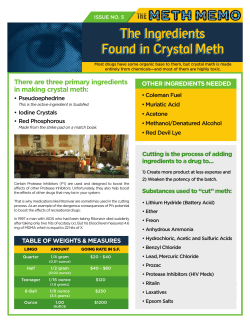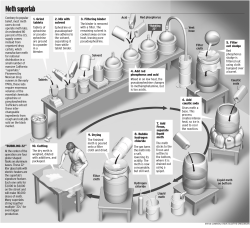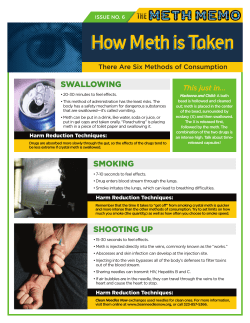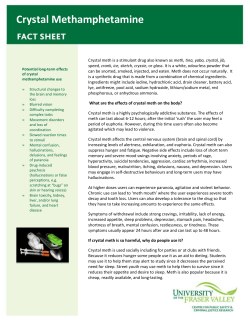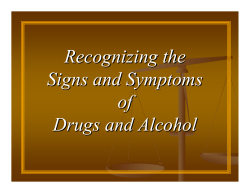
crystal methamphetamine and psychosis
This resource developed by: crystal methamphetamine and psychosis Crystal Meth (Methamphetamine) has been shown to cause psychosis and to worsen or cause recurrences of psychosis in people who already have psychosis. Family history of psychosis + crystal meth = psychosis Psychosis is an illness of the brain that makes it difficult to think and may cause a person to hear, see or believe things that seem real, but aren’t. Crystal meth can cause psychosis on it’s own if used heavily or by someone who has some other risk factors for psychosis. Some of those people who get psychosis from using crystal meth keep having psychotic symptoms after they stop using. So crystal meth isn’t good for anyone, but it is very important to stop using crystal meth if you have had psychosis or have a family history of mental illness. Does using Methamphetamine prevent me from recovering? Yes. People who use meth and are at risk for schizophrenia get sick enough to need to go to the hospital at a younger age than people who don’t. They also have more severe symptoms, and more problems in their life. Continuing meth use makes it much more difficult to follow through with treatment and the things that are necessary to get well. Continuing to use crystal meth after psychosis will cause relapses. The more relapses you have, the less effective treatment will be to help you get better, and the more likely you will get additional symptoms. Recovery is possible. You deserve to recover Crystal meth can be pretty attractive at first, particularly if you’ve got other things going on in your life that make life difficult. However, it’s a one way track to life getting worse and worse, particularly if you’re recovering from a mental illness. You deserve to get well and you deserve to be happy. The top edge is a SPECT scan of a normal brain. The bottom image is a scan of a brain damaged by meth use showing reduced activity. (image: Dr. Amen, Amen Clinic) crystal meth and psychosis You Deserve Help Set small goals for yourself. The reasons most people use— feeling good about yourself, relief from depression and anxiety, being social with others—are things everyone needs. “Take baby steps. Stop using for an hour, or a day at first. Try cutting back gradually on the amounts you do use.” A counsellor can help you find a way to get what you need in a way that doesn’t permanently damage your brain or body. Get rid of everything that is connected to using. Some people take meth to help them cope with traumatic experiences, depression or struggles getting by. If this is true for you, you deserve real help for these real problems. Things can get better. “Make it hard for your dealer and acquaintances to reach you. Make it hard for YOU to reach THEM.” “Throw out their phone numbers. Change yours.” Be honest with your treatment team about drug use Even if you’re not ready to quit completely, being honest with your mental health team or doctor about what you’re using is really important. People who have successfully quit meth suggest: Avoid people, places, and things that trigger you to want to use. Be honest with your treatment team about drug use Notice when, where, why and with whom you use. Whenever you can, avoid these situations and do something else instead. Hang out with non-using friends. Even if you’re not ready to quit completely, being honest with your mental health team or doctor about what you’re using is really important. Drugs can combine badly with your treatment for psychosis, so your treatment team needs all the information to make the safest and most effective treatment recommendations. Crystal meth combined with some commonly prescribed antidepressants can be very dangerous, even fatal, for example. To get Help With Crystal Meth and Psychosis Talk to your mental health treatment team, local mental health team or family doctor. They will be able to help you find the help you need in your area. Check your local telephone listings under Health or Mental Health services for numbers. For more information and toolkits that can help you, please visit www.heretohelp.bc.ca. The British Columbia Schizophrenia Society 201 – 6011 Westminster Hwy. Richmond, B.C. V7C 4V4 T 604-270-7841 F 604-270-9861 E provincial@bcss.org www.bcss.org Funding for this project was provided by BC Mental Health and Addiction Services, an agency of PHSA.
© Copyright 2025
